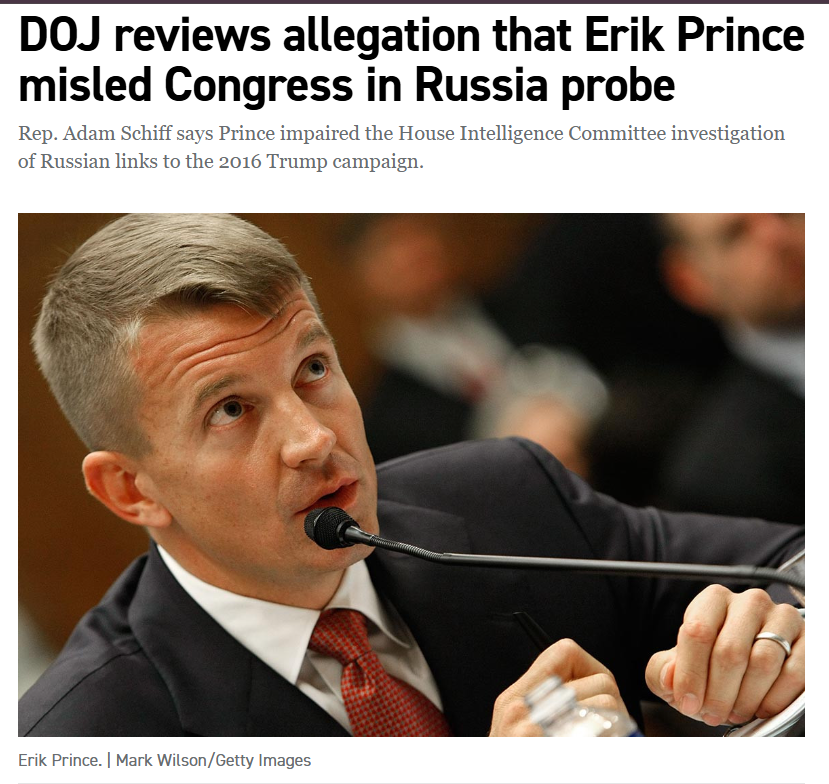Introduction
Erik Prince has long been a controversial figure, known for his role in founding Blackwater, a private military company that gained notoriety for its involvement in U.S. military operations. Over the years, Prince has expanded his business empire into global security services, logistics, and military contracting, often operating in legally and ethically ambiguous territories. His extensive network of business dealings, allegations of illicit activities, and high-profile lawsuits have raised significant concerns regarding potential anti-money laundering (AML) violations and reputational risks.
This investigation examines Prince’s business relations, legal entanglements, undisclosed affiliations, and the broader implications of his actions. By analyzing his involvement in various industries, financial transactions, and legal battles, we aim to provide an in-depth look at the risks associated with engaging with Erik Prince and his business entities.

Business Ventures and Networks
Blackwater and Its Evolution
Blackwater, founded by Erik Prince in 1997, was initially positioned as a premier private security firm providing training and military contracting services to the U.S. government. During the Iraq War, Blackwater secured lucrative government contracts, with Prince leveraging his military background and political connections to expand operations rapidly.
However, the company quickly became infamous for its aggressive tactics, operational misconduct, and alleged human rights abuses. The 2007 Nisour Square massacre, in which Blackwater contractors killed 17 Iraqi civilians, led to global condemnation and multiple legal actions against the firm and its personnel. This event was a turning point, exposing the lack of accountability and oversight in private military operations.
In response to mounting scrutiny, Blackwater underwent a series of rebranding efforts, becoming Xe Services in 2009 and later Academi in 2011. The rebranding was an attempt to distance the firm from its controversial past, but its operations and leadership remained largely unchanged. Despite these efforts, public perception of Prince and his ventures remained tainted by Blackwater’s legacy.
Frontier Services Group (FSG)
Following his departure from Blackwater, Prince shifted his focus to global security logistics through Frontier Services Group (FSG), a Hong Kong-based firm specializing in aviation, logistics, and security services. FSG’s primary operations include facilitating China’s Belt and Road Initiative (BRI), raising ethical concerns about its ties to authoritarian regimes.
Reports indicate that FSG has provided security services in conflict-prone regions, further complicating its legal and reputational standing. The firm has also been accused of engaging in covert military training programs for Chinese entities, sparking concerns about potential violations of U.S. laws that prohibit unauthorized military collaboration with foreign governments.
Prince’s involvement with FSG highlights his continued interest in global security operations, but it also underscores his willingness to engage in ventures that may conflict with U.S. foreign policy and regulatory frameworks.
Involvement in Libyan Conflict
In 2019, a United Nations report alleged that Prince violated the international arms embargo by supplying weapons and personnel to Libyan warlord Khalifa Haftar. These allegations, if proven, could lead to severe legal consequences, as they directly contravene international law and U.S. foreign policy.
Prince’s reported activities in Libya included attempts to deploy private military forces, surveillance aircraft, and armed drones to assist Haftar’s forces. The operation, allegedly codenamed “Project Opus,” was linked to efforts to destabilize the Libyan government and influence the outcome of ongoing conflicts in the region.
These allegations add to a pattern of Prince’s involvement in conflicts where private military forces operate in legal gray areas, often blurring the lines between legitimate security services and unauthorized paramilitary activities.
Alleged Links to Mercenary Operations
Reports suggest that Prince has explored opportunities to provide private military services to countries in the Middle East and Africa. Allegations include proposals to deploy mercenaries in Yemen and Venezuela, further raising ethical and legal concerns about his involvement in global conflicts.
A leaked proposal reportedly outlined Prince’s plan to establish a private force in Yemen to combat Houthi rebels, potentially violating international laws that restrict the use of mercenaries in armed conflicts. Similarly, in Venezuela, Prince was allegedly involved in discussions to provide security services for the government of Nicolás Maduro, despite existing U.S. sanctions on the regime.
These activities raise serious questions about Prince’s role in shaping global conflicts and the extent to which private military contractors can operate outside conventional legal frameworks.

Legal Challenges and Allegations
Alleged Fraudulent Practices
Prince has been accused of employing fraudulent tactics to suppress critical media coverage. Investigations indicate that he or his associates may have submitted false Digital Millennium Copyright Act (DMCA) takedown notices to remove unfavorable content from search engines. If proven, these actions could constitute perjury, fraud, and digital manipulation.
Additionally, there have been concerns that Prince has used shell companies and undisclosed financial networks to obscure his business activities. Such tactics, if confirmed, could lead to further legal scrutiny and potential regulatory actions.
U.S. Investigations and Congressional Scrutiny
Prince has faced multiple U.S. government investigations, including scrutiny from Congress over his dealings with foreign entities. His alleged role in setting up secret meetings between Russian operatives and Trump campaign associates during the 2016 election drew significant attention.
While Prince has denied any wrongdoing, his connections to politically sensitive operations have continued to draw the interest of law enforcement agencies and regulatory bodies. The U.S. Department of Justice has reportedly investigated Prince for potential violations of arms export control laws, with ongoing inquiries into his international dealings.
Defamation Lawsuits and Media Suppression
Prince has taken legal action against media outlets that have reported on his activities. In 2020, he sued The Intercept over an article detailing his alleged business dealings. The lawsuit was dismissed due to a lack of evidence proving actual malice. This legal strategy highlights ongoing efforts to control his public image amid mounting controversies.
Reputational Risks and Financial Implications
Public Perception and Media Scrutiny
Prince’s reputation has been significantly impacted by media coverage highlighting his involvement in military contracting, mercenary operations, and alleged legal violations. His close associations with controversial political figures further amplify the risks for businesses and financial institutions engaging with his ventures.
Anti-Money Laundering (AML) Risks
Given his extensive dealings in high-risk sectors, Prince’s financial transactions may raise red flags for money laundering concerns. His involvement in conflict zones and alleged violations of international sanctions create significant exposure for financial institutions processing transactions linked to his businesses.
Potential Sanctions and Regulatory Actions
With ongoing investigations and potential violations of international laws, Prince and his affiliated entities may face sanctions from U.S. and global regulatory bodies. Businesses and financial institutions must conduct enhanced due diligence before engaging in transactions involving his companies.
Conclusion
Erik Prince’s business operations, legal entanglements, and controversial dealings present significant reputational and regulatory risks. While he remains a powerful figure in the private security industry, his associations with mercenary activities, alleged violations of international law, and repeated legal challenges raise substantial concerns for stakeholders. Investors, financial institutions, and business partners should exercise extreme caution and conduct thorough risk assessments before engaging with any entities linked to Prince. Moving forward, greater regulatory scrutiny and transparency will be crucial in mitigating the risks associated with his activities.







